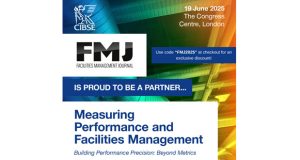 THE CEO’S VIEW
THE CEO’S VIEW
MATT CHAPMAN
CEO, SBFM
The FM sector is under significant pressure, with financial constraints being a core problem. On the client side, more is being demanded for less, and we have seen a more competitive environment and internal struggles across providers due to overpromises and under-delivery. Many providers are folding because of a failure to navigate shrinking margins and higher expectations, while the talent pool that could potentially add a welcome boost to the efficiency of FM providers is also shrinking. Looking ahead I think we can expect to see more mergers and acquisitions as owner-operated businesses look to ‘cash out’ in response to these growing pressures.
Finding ways to streamline processes while still maintaining a high quality of service for clients will underpin operations in 2025. Technology has the power to aid this enormously, with AI set to play a vital role in time reduction. Chatbots and general automation of administrative tasks can increase efficiency and provide a smoother client experience, while predictive maintenance allows for a better handle on assets and their potential failings, ahead of time.
A further challenge for the sector comes in the form of new Government legislation regarding employment rights. An imbalance exists across the sector regarding equality of opportunity, and Labour’s welcome plans to enhance employee protection and promotion of fair treatment will see challenges as providers shift to accommodate this. This will see a new phase of growth and greater accountability for the sector.
FM can be a driving force for positive social change, benefitting both individuals and communities, and we will likely see a further push towards that in 2025. Becoming a fairer, more inclusive industry with more opportunities can result in increases to job creation and apprenticeship investment, improving the talent pool and the overall health of the industry, while improving morale for existing workers. The FM industry presents myriad long-term career pathways with ample opportunity for personal and professional growth. The industry needs to work on shifting perceptions, so we can attract younger generations of talent that want to intentionally establish FM as a career of choice, not just a fallback option.
Strategic partnerships and close working relationships between FM providers and clients will be more critical than ever before to understand pain points and deliver true value, as well as achieving shared goals in areas like sustainability, and social value. FM is a resilient, adaptable industry with a willingness to continuously evolve and tackle challenges head on. I am very optimistic about the future of FM.
 THE TECHNOLOGY EXPERT’S VIEW
THE TECHNOLOGY EXPERT’S VIEW
PAUL MCCARTHY
CTO, SERVICE WORKS GLOBAL
Two key forces that will define the sector’s priorities in 2025 are the urgency to achieve net zero and the transformative potential of accessible technology, particularly AI. The strategic adoption of tech such as AI and IoT can empower FM professionals to meet these environmental challenges head-on, creating smarter, more sustainable workplaces.
Improved efficiency is central to hitting sustainability targets as organisations must make better decisions about resource use to reduce carbon footprints. But you can’t manage what you can’t measure. Many facilities still rely on disparate, static data sources such as spreadsheets or legacy systems, limiting their ability to optimise energy use or predict maintenance needs. The biggest barrier to a digitised estate is taking that first step and gathering the data. Once you have digitised, it unlocks a whole world of insights and actions that will revolutionise estate management.
Digitising a facility’s footprint and consolidating information from varied sources equips FMs to make informed decisions – whether that’s adjusting HVAC systems based on occupancy data or scheduling cleaning only in used spaces. AI-powered analytics can deliver real-time insights into building performance, and these efficiencies reduce operational costs as well as drive meaningful environmental gains.
One misconception about AI and IoT solutions is that they are complex and costly to implement. There are plenty of scalable options that enable organisations to start small, such as installing occupancy sensors in key areas, see the benefits and expand over time. This makes advanced technologies accessible even to those with limited budgets, which should accelerate adoption across the sector.
AI can analyse data and generate actionable insights. For instance, software that can leverage predictive maintenance models to anticipate when equipment, such as escalators or heating systems, will require attention. This approach minimises unnecessary maintenance, reduces downtime, and lowers energy consumption – all while extending asset lifespans. AI-driven tools can also analyse patterns, such as energy use during different times of day, to refine operational strategies. For FMs, this level of granularity represents a game-changer in resource efficiency.
The FM industry must embrace interconnected tech ecosystems. While many facilities already use some form of smart technology, these systems often operate in silos. Utilising software that integrates seamlessly with other platforms is a must. By creating a single view of real-time data, FMs can optimise everything from space utilisation to carbon reporting, helping them align with broader ESG goals.
The push for net zero isn’t just an operational imperative; it’s a societal one. FMs play a pivotal role in shaping how we interact with our built environment. By embracing digitalisation and making use of AI, the sector can unlock new efficiencies, reduce emissions, and contribute to a more sustainable future. As tech and AI solutions become more widely adopted, I expect FMs to move beyond incremental gains and achieve systemic change. In 2025, the FM sector has the tools, and the opportunity, to lead the way towards a smarter, greener world.





